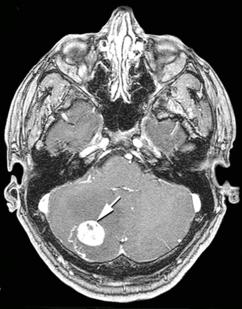
Von Hippel-Lindau (VHL) disease is a rare genetic condition that can cause tumors and cysts to form in various parts of the body. The condition is caused by a mutation in the VHL gene, which is responsible for regulating cell growth. This mutation can lead to the development of tumors and cysts in the brain, spinal cord, kidneys, and other organs. While the symptoms of VHL disease can vary widely from person to person, there are several common signs and symptoms that may indicate the presence of the condition.
In this article, we will explore the common symptoms of VHL disease and discuss how the condition is diagnosed and treated. If you or a loved one are experiencing any of the symptoms mentioned in this article, it is important to seek medical attention for an accurate diagnosis and appropriate care.
1. Vision Problems
One of the most common symptoms of VHL disease is the development of tumors in the eyes, which can cause vision problems. These tumors, known as retinal hemangioblastomas, can lead to symptoms such as blurry vision, blind spots, and even vision loss in severe cases. If you are experiencing any changes in your vision, it is important to see an eye specialist for a thorough examination.
2. Headaches
Another common symptom of VHL disease is the onset of frequent or severe headaches. These headaches may be caused by the presence of tumors in the brain or spinal cord, which can put pressure on surrounding tissues and cause discomfort. If you are experiencing persistent headaches that do not respond to over-the-counter pain medication, it is important to see a doctor to rule out any underlying medical conditions.
3. High Blood Pressure
High blood pressure, also known as hypertension, can be a symptom of VHL disease, particularly when the condition affects the adrenal glands. Tumors in the adrenal glands can lead to the overproduction of certain hormones, which can in turn cause high blood pressure. If you have been diagnosed with high blood pressure and are experiencing other symptoms mentioned in this article, it is important to discuss the possibility of VHL disease with your healthcare provider.
4. Kidney Problems
Tumors and cysts in the kidneys are a common feature of VHL disease and can lead to a range of symptoms, including blood in the urine, pain in the abdomen or lower back, and changes in urinary habits. If you are experiencing any of these symptoms, it is important to discuss them with your doctor, who may recommend further testing to determine the underlying cause.
5. Hearing Loss
Tumors in the inner ear, known as endolymphatic sac tumors, can cause hearing loss in individuals with VHL disease. If you are experiencing changes in your hearing, such as difficulty hearing high-pitched sounds or ringing in the ears, it is important to see an audiologist for a hearing evaluation. Addressing hearing problems early on can help prevent further complications and improve quality of life.
6. Pancreatic Symptoms
VHL disease can also affect the pancreas, leading to the development of cysts and tumors in this organ. Symptoms of pancreatic involvement may include abdominal pain, changes in bowel habits, and unexplained weight loss. If you are experiencing any of these symptoms, it is important to bring them to the attention of your healthcare provider for further evaluation.
7. Neurological Symptoms
Because VHL disease can cause tumors to form in the brain and spinal cord, individuals with the condition may experience a range of neurological symptoms, including dizziness, balance problems, muscle weakness, and even paralysis in severe cases. It is important to seek medical attention if you are experiencing any neurological symptoms, as early intervention can help prevent further damage to the nervous system.
8. Liver Involvement
Tumors and cysts can also develop in the liver of individuals with VHL disease, which can lead to symptoms such as abdominal pain, jaundice, and a feeling of fullness in the upper abdomen. If you are experiencing any of these symptoms, it is important to consult with your doctor to determine the underlying cause and appropriate management.
9. Reproductive Problems
Women with VHL disease may experience reproductive issues, such as cysts and tumors in the ovaries or uterus, which can lead to symptoms such as pelvic pain, irregular menstrual cycles, and difficulty conceiving. It is important for women with VHL disease to discuss their reproductive health with a gynecologist who can provide specialized care and support.
10. Genetic Counseling
Given that VHL disease is a genetic condition, individuals with a family history of the condition may benefit from genetic counseling. Genetic counselors can provide information about the inheritance pattern of VHL disease, the likelihood of passing the condition on to future generations, and available testing options. By seeking genetic counseling, individuals can make informed decisions about their reproductive choices and access the support they need to navigate the complexities of living with a genetic condition.












